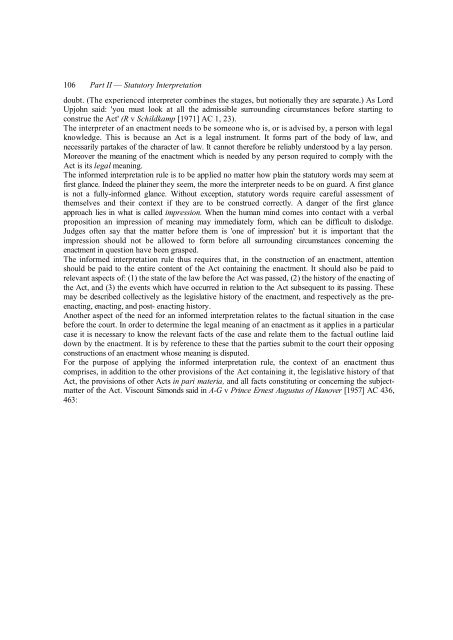Statutory Interpretation The Technique of Statutory ... - Francis Bennion
Statutory Interpretation The Technique of Statutory ... - Francis Bennion
Statutory Interpretation The Technique of Statutory ... - Francis Bennion
Create successful ePaper yourself
Turn your PDF publications into a flip-book with our unique Google optimized e-Paper software.
106 Part II — <strong>Statutory</strong> <strong>Interpretation</strong><br />
doubt. (<strong>The</strong> experienced interpreter combines the stages, but notionally they are separate.) As Lord<br />
Upjohn said: 'you must look at all the admissible surrounding circumstances before starting to<br />
construe the Act' (R v Schildkamp [1971] AC 1, 23).<br />
<strong>The</strong> interpreter <strong>of</strong> an enactment needs to be someone who is, or is advised by, a person with legal<br />
knowledge. This is because an Act is a legal instrument. It forms part <strong>of</strong> the body <strong>of</strong> law, and<br />
necessarily partakes <strong>of</strong> the character <strong>of</strong> law. It cannot therefore be reliably understood by a lay person.<br />
Moreover the meaning <strong>of</strong> the enactment which is needed by any person required to comply with the<br />
Act is its legal meaning.<br />
<strong>The</strong> informed interpretation rule is to be applied no matter how plain the statutory words may seem at<br />
first glance. Indeed the plainer they seem, the more the interpreter needs to be on guard. A first glance<br />
is not a fully-informed glance. Without exception, statutory words require careful assessment <strong>of</strong><br />
themselves and their context if they are to be construed correctly. A danger <strong>of</strong> the first glance<br />
approach lies in what is called impression. When the human mind comes into contact with a verbal<br />
proposition an impression <strong>of</strong> meaning may immediately form, which can be difficult to dislodge.<br />
Judges <strong>of</strong>ten say that the matter before them is 'one <strong>of</strong> impression' but it is important that the<br />
impression should not be allowed to form before all surrounding circumstances concerning the<br />
enactment in question have been grasped.<br />
<strong>The</strong> informed interpretation rule thus requires that, in the construction <strong>of</strong> an enactment, attention<br />
should be paid to the entire content <strong>of</strong> the Act containing the enactment. It should also be paid to<br />
relevant aspects <strong>of</strong>: (1) the state <strong>of</strong> the law before the Act was passed, (2) the history <strong>of</strong> the enacting <strong>of</strong><br />
the Act, and (3) the events which have occurred in relation to the Act subsequent to its passing. <strong>The</strong>se<br />
may be described collectively as the legislative history <strong>of</strong> the enactment, and respectively as the preenacting,<br />
enacting, and post- enacting history.<br />
Another aspect <strong>of</strong> the need for an informed interpretation relates to the factual situation in the case<br />
before the court. In order to determine the legal meaning <strong>of</strong> an enactment as it applies in a particular<br />
case it is necessary to know the relevant facts <strong>of</strong> the case and relate them to the factual outline laid<br />
down by the enactment. It is by reference to these that the parties submit to the court their opposing<br />
constructions <strong>of</strong> an enactment whose meaning is disputed.<br />
For the purpose <strong>of</strong> applying the informed interpretation rule, the context <strong>of</strong> an enactment thus<br />
comprises, in addition to the other provisions <strong>of</strong> the Act containing it, the legislative history <strong>of</strong> that<br />
Act, the provisions <strong>of</strong> other Acts in pari materia, and all facts constituting or concerning the subjectmatter<br />
<strong>of</strong> the Act. Viscount Simonds said in A-G v Prince Ernest Augustus <strong>of</strong> Hanover [1957] AC 436,<br />
463:

















